Thai people or at least the people that I am surrounded by care very much about how they present themselves in public. Often I will hear stories about girls who put in so much effort in perfecting the pictures they post on Instagram in ways I would never have imagined. Yesterday I was talking to my friend when she told me how her friend caught another of their friend photoshopping her picture by cutting out her lips from another picture and paste it over her lips on the photo she just posted (because she preferred the lip shape she had on that other one over this one). The society also thinks that it is okay to greet one another by commenting about each others weight. Instead of asking about things you have been up to, the sentence that comes after “hello” is “have you gained/lost weight?” I feel like even though it is already bad in Thailand, Korea is on a new, even worse level. Although people go very far to make themselves look great, altering the body has never been encouraged by the media in the same way that it is going on in Korea.
Cho Joo-Hyun engages concepts such as bipower and control to analyse women’s management of their bodies after the financial crisis in South Korea in 1997. Cho seems to suggest that thethe neoliberal system caused an increased interest in the body, inclusing diet, physical control, pastic surgery as well as body care in general. She conceptualizes the adoption of gender practices by women over their own bodies as “technologies of the self”. In “The Politics of the body in Contempory Korea Kim Eun-Shil wrote “the “fit” body have all become part of the everyday lives of Koreans through diverse media”. Even now I cannot understand why the lyrics to some Korean k-pop songs are even the way they are but I think it sums up this week’s reading, helping us to understand the extent Koreans openly obsess over their appearance and how the society as a whole is very beauty oriented.
1) https://www.youtube.com/watch?v=CXXrOhdOCJU …. Im wearing a mini skirt for you
2) https://www.youtube.com/watch?v=_WiPDNlWs7Y…I’m going to cut my hair off so you notice me
3) https://www.youtube.com/watch?v=Vr_Ad4acSwA … I need to change in order to be loved
https://www.youtube.com/watch?v=Wv3TjfZiIu4 …this is about a girl who loses weight and goes through plastic surgery in order to become successful star
http://www.allkpop.com/buzz/2014/08/10-shocking-transformations-part-2-the-wonders-of-cosmetic-surgery 
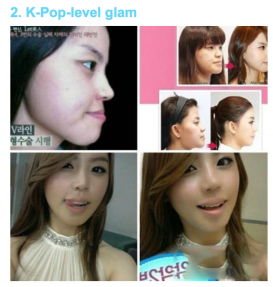

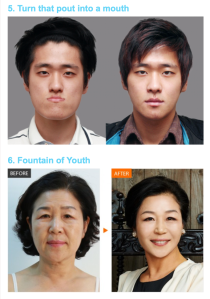

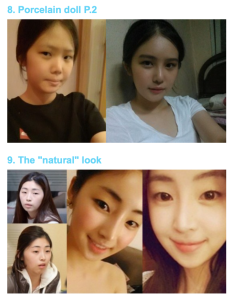


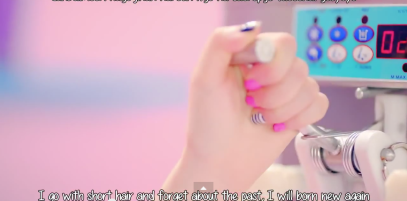
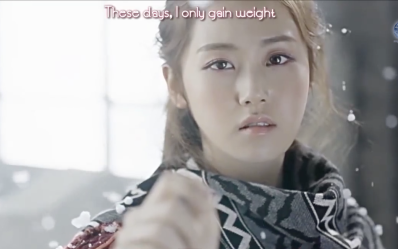

I wonder how Foucault’s theory on governmentality play into this plastic surgery culture that Cho Joohyun discusses. According to Foucault, homo economicus is someone responding to “systematically to systematic modifications artificially introduced into the environment.” I think that it can be argued that the plastic surgery industry is a systematic modification. It is introduced to the “environment,” or the country’s culture, in multiple ways. Mainly it appears to be done through the images of extreme makeovers and the music of female musicians, as you point out. I think that it is also useful to examine how gender functions in this, as Choo Joohyun points out that Foucault does not do. In the examples you provide at the end of your post, there does appear to be differences in the media’s portrayal of makeovers and plastic surgery based on gender. While the photos of extreme makeovers seem to be fairly equally focused on both men and women, the three music videos that you linked to were all female pop stars. Is it more common for female celebrities to have a focus on changing their appearance? Why is this so, if makeover ads targeted at consumers appeal to both men and women equally? I would really like to know more about the differences between celebrity culture and services directed at consumers.
LikeLiked by 1 person
I was really interested in how Korean Society interacts with gender with the “I’m wearing a miniskirt for you” and the males before and after results for plastic surgery. Its also interesting to note how similar the girls look in the AOA video. Their face shapes and features are all edited and their hairstyles (particularly the few blonds) emanate western style. I think it’s important to note the influences of transnational beauty standards on the aesthetic these women strive to obtain. It would be interesting to dive further into the influences by looking at how consumerism influences these women. Cho Joohyun described Korea as a “heaven for consumers.” And those consumers are investing in their appearance. In class we’ve discussed how headshots are attached to resumes, giving people increased anxiety and importance surrounding their appearance. It would be interesting to dive more about the class divide that comes with increased beauty practice (i.e. wealthy can afford surgery, get better looking headshot, get better job—continues economic cycle).
LikeLiked by 1 person
This post brought up a lot of things for me. I’m constantly reconciling my views about body work and beauty work: how much of it is about agency and identity and how much of it is about pressure? Through the lyrics you posted, it definitely seems like one of the driving influence for those undergoing plastic surgery in South Korea related to how they will be perceived by external forces. As Cho Joo-Hyun suggests, the emphasis on physical beauty seems to be tied to broader cultural, political, and social systems that are deeply rooted in South Korean culture. My issue, however, is that it seems like Western media outlets may be misrepresenting this with sensationalizing articles and egregious before and after photos. Instead of attempting to understand or critically engage with the trend of plastic surgery in South Korea in a productive way, the media instead seems to be hellbent on packaging these stories in a way that exoticizes the culture and makes it seem perhaps more bizarre than it is. After all, people are obsessed with their looks in America as well. I’m just starting to wonder: how much of this “plastic surgery crazed South Korea” thing is constructed by the media and how much of it is real.
LikeLiked by 1 person
Similar to Korea, the cosmetic surgeries that have gained popularity in China in recent years all seem to share a common characteristic – they cater to Western standards of beauty. According to Dr. Kim Byung-gun, the director of South Korea’s largest plastic surgery clinic, BK DongYang, “The Chinese and Korean patients tell me that they want to have faces like Americans. The idea of beauty is more westernized recently. That means the Asian people want to have a little less Asian, more westernized appearance. They don’t like big cheekbones or small eyes. They want to have big, bright eyes with slender, nice facial bones” (1). Martin Wong, an Asian-American editor for Giant Robot magazine, regards this Western idealization as “a form of ‘cultural imperialism’”. He believes that Asians who participate in procedures which seek to conform to a Caucasian aesthetic are “making a statement about their own race, about where they come from, who they are […] They’re not doing it on purpose. They’re not saying that they think they’re inferior looking. They’re not saying they’re ugly, but that’s the message that they’re giving nonetheless” (2). In her documentary, “Change My Race”, Julia Redwood explores this issue, “this dominant culture that beauty comes down to being blindingly white and western and the fact that Asian women and African women and all types of ethic women have a longer way to attain that standard to the point where they’re altering racial elements of their appearance,” in great detail. She remarks that “one of the most shocking things [she] saw was calf muscle reduction – the process where an incision is made behind the knee of about one centimetre and part of the calf muscle is literally ripped out with these long tongs” (3). Many blame the media for having developed this internalized racism in the minds of consumers, that “Western” is better and that the Asian “look” is lesser than or unattractive. One of the women interviewed in Redwood’s documentary, Thuy Phan, is a beauty therapist in Australia and a cosmetic surgery consumer herself. When asked about the source of “the pressure for Asian women to adhere to the ‘wide-eyed’ caucasian standard”, Phan cited “movies, TV, magazines … everywhere […] if we had nothing else to compare ourselves to we wouldn’t feel ugly at all […] We always want what we can’t have” (4). Given the patriarchal nature of this “cultural imperialism”, as with any domineering act of forced assimilation, it is not surprising that women of color, especially those in the entertainment industry who are often viewed as representatives of a nation, are made to feel the most insecure about their appearance in the wake of globalization and are resultantly the primary consumers of cosmetic surgery.
(1) Lah, Kyung. “Plastic Surgery Boom as Asians Seek ‘western’ Look.” CNN. Cable News Network, 23 May 2011. Web.
(2) Lah, Kyung.
(3) Harris, Amy. “Asian women are turning to plastic surgery to look more caucasian.” The Sunday Telegraph. The Daily Telegraph, 30 Nov 2013. Web.
(4) Harris, Amy.
LikeLiked by 1 person
I think you’re absolutely right Belle, looking at the stills and lyrics from the K-Pop videos you posted, I can’t help but connect it to the way we view beauty here. At first looking at the lyrics can be surprising, but when we really think about it, this this type of “I need to change in order to be loved” mentality, is all over pop culture in the states. When I was younger, I remember seeing Taylor Swift’s music video for “You Belong With Me” and talking to my friends about it. We all noticed how it wasn’t until she changed her “nerdy” clothing and ditched the glasses, that the guy she was interested in, noticed her.
I think the K-Pop lyrics are just more forward representations of what our cultures constantly tell us to do. If love songs in the US were really honest in their lyrics, we would see similar themes, and already do. It is interesting when we look at the way that beauty and love are depicted in the media, because most advertisements assume the women they are targeting are desperate to get a man’s attention, meanwhile the man is disinterested. We always see the woman’s interest is assumed, and it is up to her to use her sex appeal to change the guy’s mind.
LikeLiked by 1 person
i totally i agree with YOU too. btw i did not know you can youtube post on a comment 🙂
LikeLike